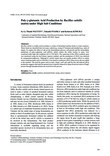Bacillus subtilis is widely used to produce a variety of fermented soybean foods in Asian countries. These foods are classified into two types: salted (e.g., tuong of Vietnam) and unsalted (e.g., natto of Japan). To explore the effect of salt on the fermentation process, cell growth and the extracellular production of poly-γ-glutamic acid (γPGA), which confers the sticky texture to natto, were examined under high salt conditions (0.5-1.5 M NaCl). The expression of the γPGA synthetic gene was monitored using the lacZ-fusion reporter method, and the production of γPGA was detected by immunoelectrophoresis. Although B. subtilis (natto) does not usually produce γPGA in carbon source-limiting media such as LB broth, it was found to synthesize γPGA when excess salt was added to the medium. The need for genes such as degU, degQ, comP and sigB for this salt-induced γPGA production suggests that both the general stress response induced by sigma B and activation of DegU protein through phosphorylation are involved in this process.

